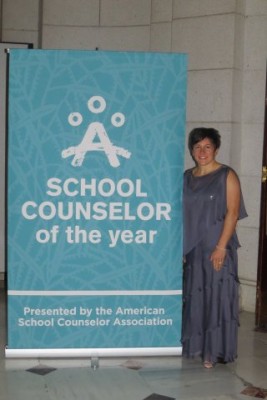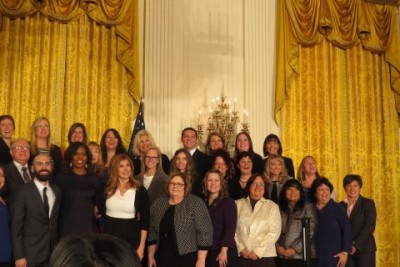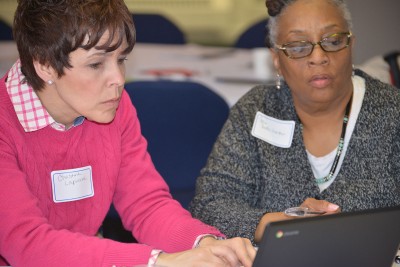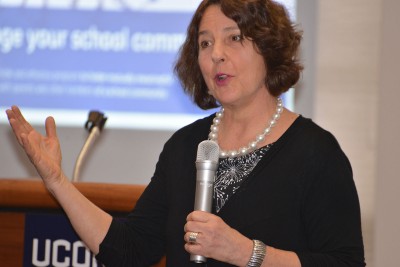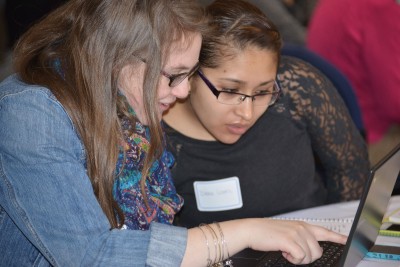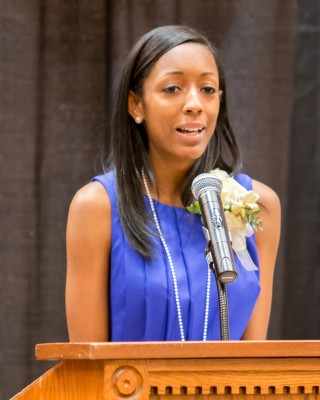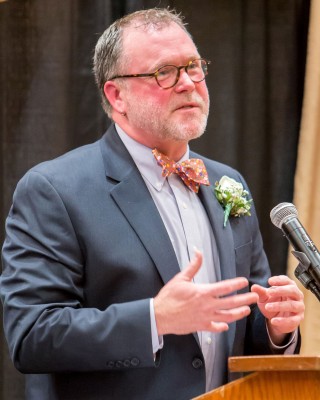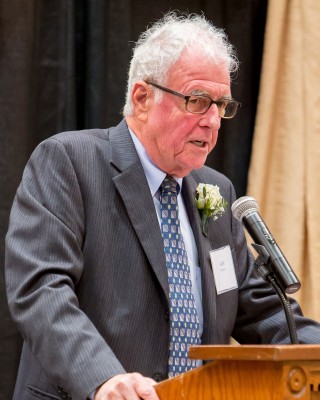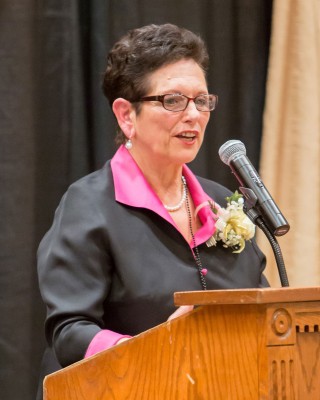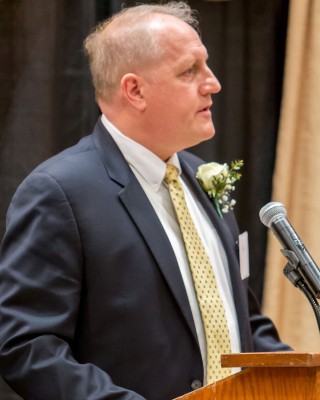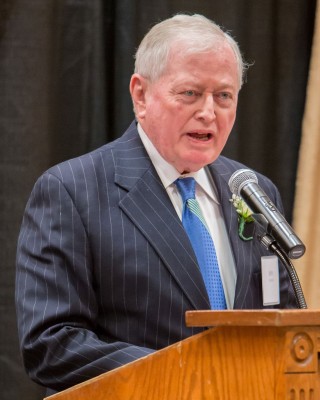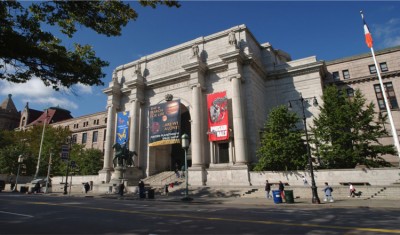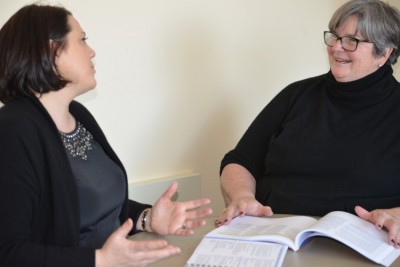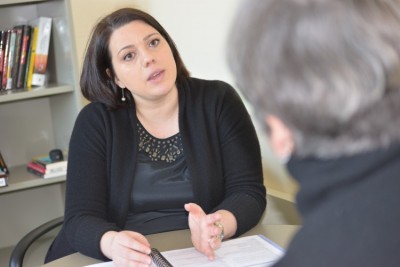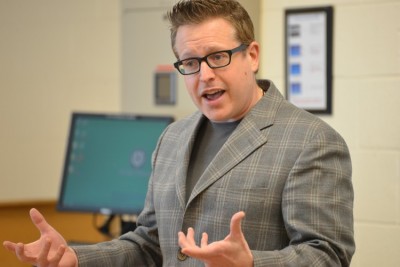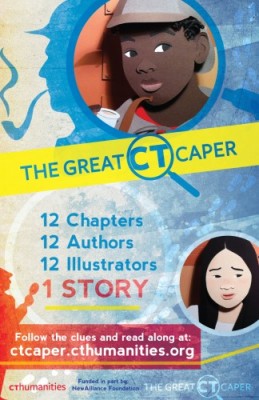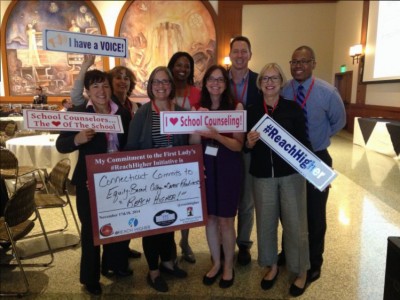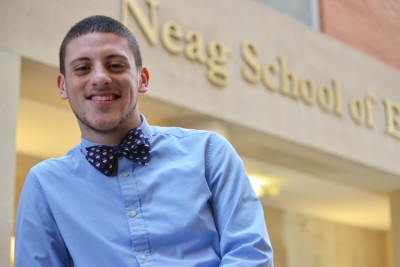
It is his love for – and from – his family that drove fifth-year master’s student Justis Lopez to pursue college and to better himself. Among his biggest influences has been his mother, who worked three jobs to help support him, his younger brother and sister, along with his father, who had been injured on the job.
“She was always there, and my father, too, pushing us to be better people,” says Lopez, a first-generation college student. He recalls his mother advising him: “Go to college and get an education so that you don’t have to work so many jobs as I have to, to work as hard as I’ve had to, to provide for your future and your family.”
Meanwhile, it was his high school teacher Heather (Wohlgemuth) Banas ’03 (ED), ’04 (MA) – a UConn alum – who, he says, inspired him to go into teaching.
“She was my favorite teacher,” Lopez says. “She made learning so much fun and really engaging. I fell in love with teaching, and she’s the reason why.”
Making Connections Along the Way
At UConn, Lopez has taken a leadership role in innumerable activities, from planning and emceeing a recent benefit concert for Windham High School to serving as the student speaker for the Neag School’s 2014 Commencement ceremony.
“I’ve been part of so many amazing things and been inspired by other students doing great things,” he says.

Last year, he got involved with UConn’s Hip Hop Collective, a student-run organization that seeks to empower, educate, and inspire the UConn community through exposure to hip-hop culture. The organization hosts several days of events in the spring, featuring artists, spoken word performers, a documentary screening, and more. Lopez is serving this year as the event’s education chair, where his role centers on connecting the hip-hop community and education – in part by bringing together a daylong education conference in partnership with the Neag School.
“If we could recreate that [excitement] here at … Neag, our home base for education, we can inspire the future educators of the world,” Lopez says of the education conference, which is one way in which he hopes to connect Neag with its partner schools in the community.
‘Someone Special’
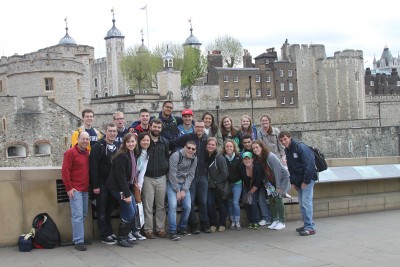
His fifth year at the Neag School has also been filled with travel opportunities. At the annual National Association of Multicultural Educators conference this past fall in Tuscon, Ariz., Lopez volunteered for and networked with faculty members, inspiring him to consider pursuing his doctorate and a possible career as a professor. The opportunity came through Justis’ connection with assistant clinical professor Mark Kohan, who calls Lopez “a catalyst for rethinking what is possible in classroom and schools. “He is a bridge-builder, not only between schools and communities, but also among students and educators from all walks of life,” Kohan says.
Meanwhile, his participation in Neag’s Social Studies Study Abroad Program – led by associate professor Alan Marcus – gave Lopez the chance to see Europe, where he visited museums and walked the beaches of Normandy.
“It was incredibly transformative; being able to step outside my comfort zone, learn about life and history through another lens,” says Lopez. A passion for becoming a global citizen, he says, is now something he envisions instilling in his future students.
Lopez’s mentors can clearly see his potential in the field of education. “Justis is one of the most energetic and humble people I know. As a classroom teacher, as a colleague, as a peer mentor, or even as the husky mascot, few people have as much energy and enthusiasm,” says Marcus, who has known Lopez since his freshman year at UConn, when, he says, “Justis walked into my office with his big grin and told me he wanted to be a history teacher. It was clear from that first meeting he would be someone special.”
“I want to … create a community where students feel like they can become whomever they desire.” —Justis Lopez ’14 (ED), ’15 MA
Lopez has also studied closely with Marcus, including following Marcus’ work on the new social studies framework, for which Marcus served as a lead writer. The framework provides the biggest change in social studies instruction in Connecticut in more than 15 years.
Through classes with Marcus, Lopez has become familiar with the new methods firsthand. “Dr. Marcus has been very proactive in preparing us to utilize these new frameworks,” Lopez says. “It has a lot of cool components, like inquiry projects where the students are developing their own projects, and they develop questions. The ending component is really unique in that it has a community-based component where students get involved with the community … It brings a holistic approach to the student.”
Future Plans
For his master’s year, Lopez is also taking part in a split internship between Manchester High School – his alma mater – and Manchester Middle School. At the middle school, he’s working on a “Cool to be Kind” initiative, an anti-bullying project. At the high school, his project focuses on “digital citizenship” in which Lopez is teaching students about “leaving a digital footprint, digital law, how to be digitally savvy, and how to be aware of what you’re posting online.”
Banas, that same teacher who inspired Lopez back in his high school days, is his supervisor on the project.
“Justis truly loves people and sees them for their best qualities, not for their shortcomings,” she says. “This will make him a truly exceptional educator because our kids need teachers who see them for their strengths. I think that Justis will inspire so many of students.”
With graduate commencement around the corner, Lopez has laid a solid groundwork for his future. He will, no doubt, have lots of opportunities from which to choose.
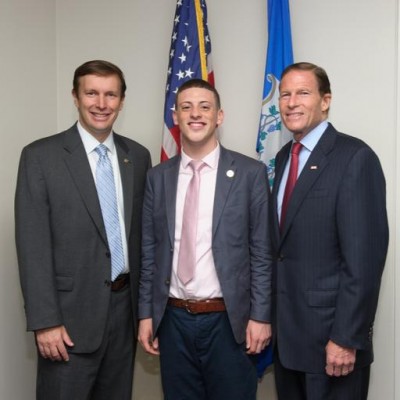
Even as he is interviewing for teacher positions with different school systems across Connecticut, New York City, and Washington, D.C., Lopez has aspirations beyond that as well – with possible sights set on eventually pursuing a position in education administration, whether it is as a school principal, superintendent, or leader in educational policy.
That said, his experiences in school were not always positive, Lopez admits. “I did not have a positive experience with my high school principal,” he says. “I received a lot of push back from our leadership, and I felt the student voices weren’t included enough.”
But, he adds, “the negative experience inspired me to want to change that … I want to become a principal so I can create a community where students feel like they can become whomever they desire. I want to create a community where teachers can lead the classrooms and create this community of people.”
Desi Nesmith ’01 (ED), ’02 MA, ’09 Sixth-Year, principal of Metacomet Elementary School in Bloomfield, has no doubt about what Lopez would bring to such a position. “Justis has the type of personality that kids will be drawn to,” says Nesmith, a 2014 Milken Award honoree. “He has an infectious personality that will immediate connect with both kids and parents. He cares deeply about the profession and those involved in it. When you talk to Justis, his passion for education and kids come through in such a rich and genuine way.”
Marcus also looks forward to following Lopez’s career. “Justis will be a great educator because he is passionate, driven, and because he cares,” he says. “He really wants to make a difference in society. This passion keeps him focused on his goals. He is always asking questions to learn more. He will learn from his students as much as they learn from him – and that is the mark of a good educator.”
Video of Justis giving a spoken word performance during the Neag Alumni Awards Dinner.
